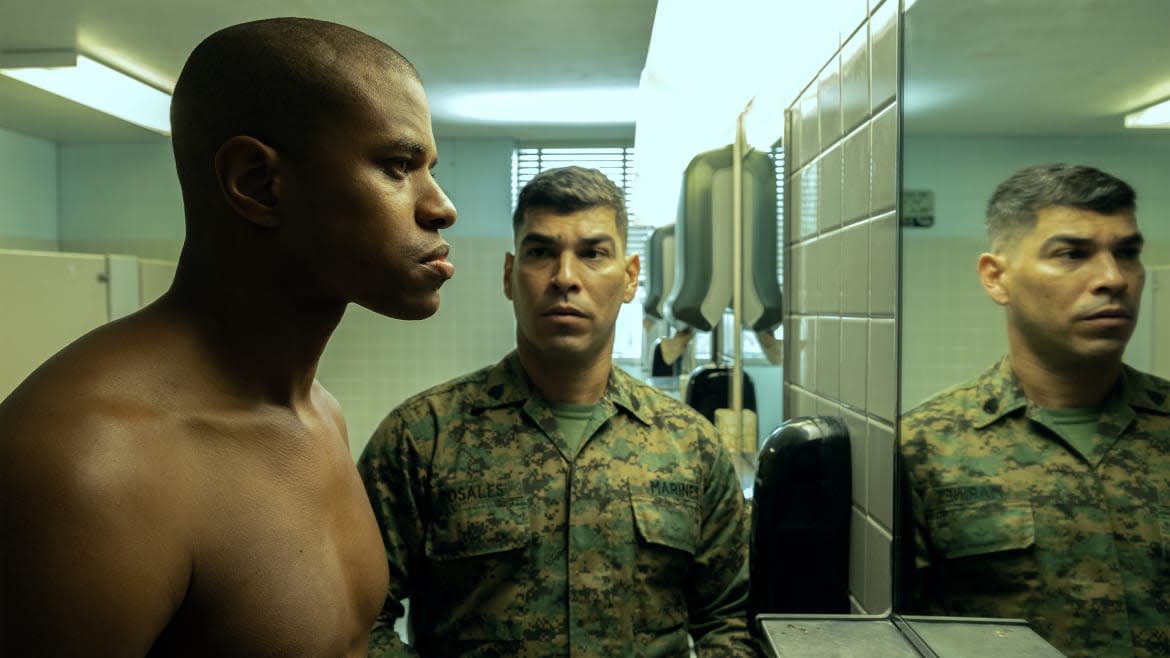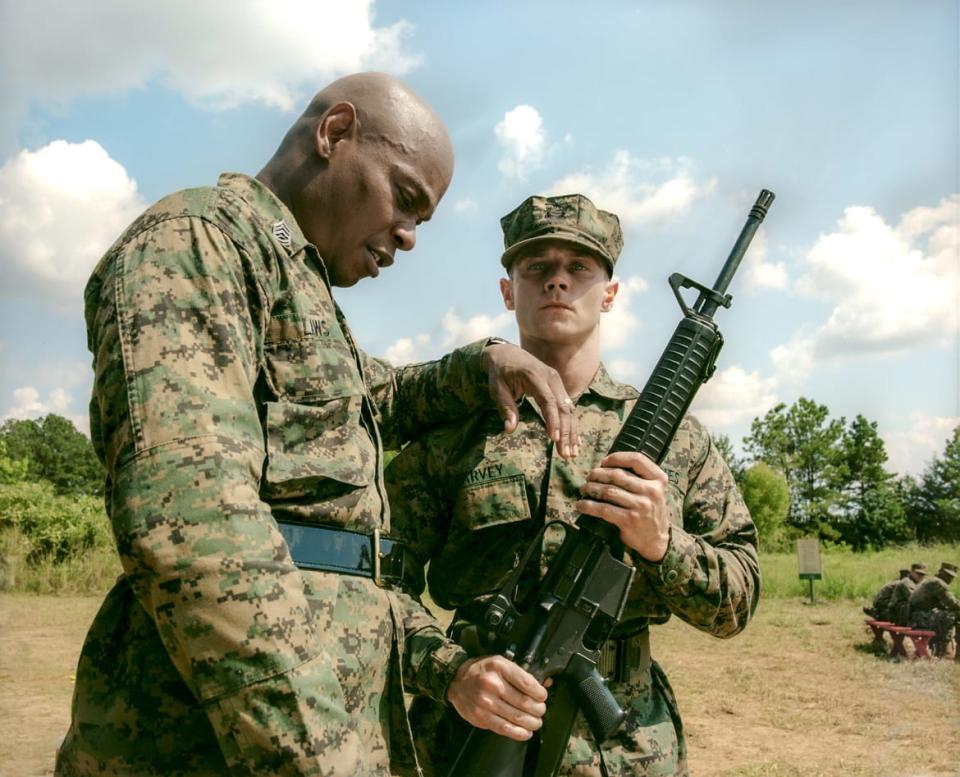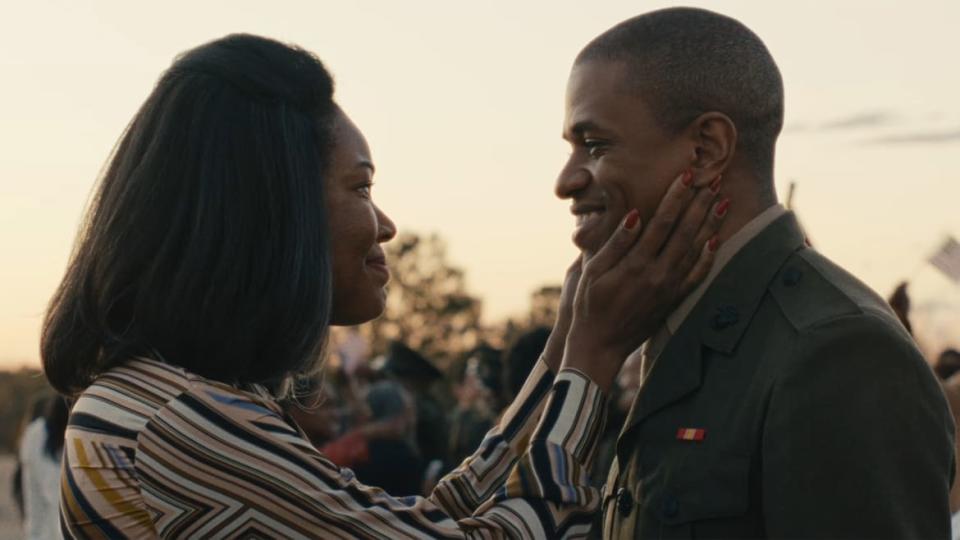A Stunning Look at a Gay Man’s Terrifying, Triumphant Time at Marines Boot Camp

- Oops!Something went wrong.Please try again later.
- Oops!Something went wrong.Please try again later.
Individuality is incompatible with the Marine Corps, where rigorous adherence to routine and protocol strives to create a cohesive fighting force. Consequently, such military service affords both an opportunity for transformation and a means of escape from oneself. It’s those facets that attract a young, gay man from Trenton, New Jersey, to enlist in The Inspection, writer/director Elegance Bratton’s sensitive and poignant drama inspired by his own experiences.
Bolstered by Jeremy Pope’s coiled, interior performance as a man in search of identity in a place that doesn’t necessarily like what it sees in him, it’s a familiar tale distinguished, and elevated, by its details.
Arriving in theaters on November 18 following celebrated screenings at the Toronto and New York Film Festivals (the latter of which highlighted it as its closing night selection), The Inspection is, among other things, a testament to the enduring authenticity and insightfulness of Stanley Kubrick’s Full Metal Jacket. Its portrait of boot camp hell is echoed in innumerable ways by Bratton’s feature directorial debut.
From cruel, barking drill sergeants and arduous tasks designed to break down recruits, to heated squadron competitions and the incessant comingling of sex and violence—most notably, via rifles that are given women’s names and stroked and poked in carnal fashion—the film’s depiction of this milieu is so eerily similar to Kubrick’s 1987 classic that it reinforces the latter’s vision of basic training as a hell that’s second only to battlefield combat.

Ellis French (Pope) doesn’t seem like someone cut out for this environment. Residing in a homeless shelter alongside other vagabonds, Ellis is a gay man adrift. In 2005 Trenton, he decides that life on the streets is no life at all, and visits his mother Inez (Gabrielle Union) to inform her that he needs his birth certificate because he plans to join the Marines. Inez barely wants to let him through the door, her disdain and exhaustion dripping off her tongue. Her demeanor becomes no kinder once she grants him entry into her cramped and cluttered apartment, and acquiesces to his demand.
In sharp, minimal strokes that are emblematic of his concise storytelling, Bratton captures the particulars of these characters and their tense relationship—she a devout prison guard who looks upon her son’s homosexual “lifestyle” with scorn, and he an on-the-skids nomad who’s hurt and angry over his mom’s continued rejection.
After a shave and compassionate conversation with a fellow “queen,” Ellis is on the bus to Parris Island, South Carolina, where he and fellow enlistees are greeted with the sorts of belligerent, harrowing screams that will become the soundtrack to their next three months. Ellis and company are under the command of instructor Leland Laws (Bokeem Woodbine), an imposing taskmaster whose smiles are far scarier than his scowls, and who—aided by underlings Brooks (Nicholas Logan) and Rosales (Raúl Castillo)—promptly peppers these newbies with questions about whether they’re communists, smoke marijuana, or are homosexual.
Denial is the order of the day, but saying is easier than doing, and in a subsequent group shower, Ellis’ mind drifts into sexual fantasy that produces a physical reaction that’s plain for everyone to see. For this exposure, and under Leland’s order, ambitious Harvey (McCaul Lombardi) and two comrades give Ellis a beating to remember.
Independence and uniqueness are anathema to the Marine Corps in The Inspection, a notion felt in the oft-repeated mantra that the purpose of a rifle is to protect the men on a soldier’s left and right side (rather than himself), as well as in the requirement that all individuals refer to themselves not with “I” but with “this recruit.”
To Ellis, his mistreatment reeks of overt homophobia (because, in an obvious sense, it is), and yet that impression is somewhat complicated by his discovery that Rosales is also living in the closet, and that Leland isn’t only prejudiced when it comes to gay men. To wit, Ismail’s (Eman Esfandi) dark skin and Muslim faith make him an easy post-9/11 target of the instructor’s abusive wrath, and Label’s (Andrew Kai) insubordinate streak likewise puts him in the bigwig’s crosshairs.

As Ellis endures hardships courtesy of Leland, Harvey and others, The Inspection expands into a larger study of the Marines as an outfit that nurtures intolerance as a method of turning disparate men into “monsters” that are united by only one thing: their oorah-ing brotherhood.
Bratton’s canny script doesn’t skimp on horrific homophobia, which rears its ugly head in cagey glances as well as blunt confrontations. Yet the film recognizes it as one component of a larger operation driven to negate everything that makes a potential soldier distinctive and vulnerable. It’s no surprise, then, that at the conclusion of Ellis’ gauntlet, the director presents close-ups of shining shoes marching in lockstep and shoulder-to-shoulder shadows moving in harmony—striking images of the personality-free uniformity craved and celebrated by this system.
Pope embodies Ellis from the inside-out, his quest to simultaneously comprehend and reshape himself taking place largely within. Ellis indulges in no histrionics in The Inspection because, in this world, they would result in instant death. Nonetheless, Pope’s slumped shoulders and wide, watery eyes communicate that which remains unspoken about his protagonist’s fury and resignation regarding an American society, military subculture, and blinkered mother that all yearn for him to change.
Gabrielle Union Should Score Her First Oscar Nod for ‘The Inspection’
The strength of Pope’s turn, and Bratton’s conception of the character, is that those emotions don’t inevitably lead to righteous anger and violence; instead, they inspire in Ellis a newfound understanding of the forces conspiring against him, and of the possibilities—for family and community—that are presented by remaking himself into a new, if still honest, version of himself.
Just as Ellis clings tightly to Inez despite her persistent narrow-mindedness, The Inspection embraces complication, casting basic training as a trial by fire that—for better and for worse, in ways both immoral and effective—destroys and restores. Bratton’s film may traverse well-trod terrain along its journey, yet by its conclusion, it’s anything but rote. On the contrary, it’s a multifaceted portrait of terror and triumph, and the unlikely power of one to give birth to the other.
Get the Daily Beast's biggest scoops and scandals delivered right to your inbox. Sign up now.
Stay informed and gain unlimited access to the Daily Beast's unmatched reporting. Subscribe now.

